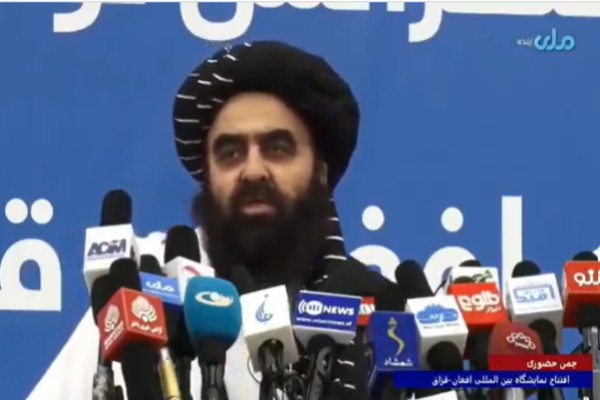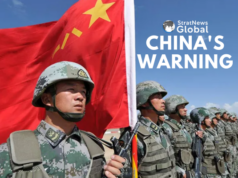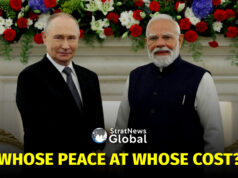
In a diplomatic first since the Taliban returned to power in August 2021, Afghanistan’s Foreign Minister Amir Khan Muttaqi is expected in New Delhi on October 9 for a high-stakes official visit. Though the dates have not been announced officially, the visit comes after a United Nations Security Council exemption allowing him to travel despite international sanctions.
Mawlawi Amir Khan Muttaqi, 55, is a senior Taliban leader with deep roots in the group’s political and ideological leadership. He played a key role during both Taliban regimes and has been the movement’s face in diplomatic engagements across the region. A veteran of the anti-Soviet jihad and a prominent figure in Taliban media and cultural outreach during their first rule, Muttaqi today serves as the Islamic Emirate’s chief diplomat.
Over the past two years, he has been instrumental in outreach efforts to regional powers like China, Iran, and now India. His visit to New Delhi will follow his participation at the Moscow Format summit on October 7, attended by representatives from Central Asia, Russia, China, and Iran.
Visit Agenda
Muttaqi’s visit is expected to focus on several fronts:
- Focus on Recognition: At the top of the Taliban’s wish list is formal recognition by India. While New Delhi has resumed limited engagement and humanitarian aid, it has not formally acknowledged the Taliban as Afghanistan’s legitimate government.
- Humanitarian and Development Assistance: Afghanistan’s economy remains in freefall, with widespread food insecurity and limited access to healthcare. Kabul is expected to request further humanitarian support, particularly in health, agriculture, and education sectors.
- Trade and Connectivity: Talks will likely explore avenues to boost bilateral trade, particularly the export of Afghan dry fruits and medicinal herbs to India. Afghanistan is also keen to leverage Indian ports, especially Chabahar in Iran, as alternative routes to bypass transit hurdles posed by Pakistan.
- Visa and Consular Services: With large numbers of Afghan students, patients, and businesspersons dependent on access to India, consular cooperation will be high on the agenda.
- Security and Counter Terrorism: The Taliban have recently expressed openness to cooperation on regional security. Their condemnation of terror attacks in India has not gone unnoticed in New Delhi, and the visit may further discussions on counter terrorism collaboration.
Afghanistan Is Important
India has long viewed Afghanistan through a strategic and cultural lens. A stable and friendly Kabul government helps counter terrorism, limits Pakistan’s regional influence, and opens up energy and trade corridors to Central Asia.
While connectivity projects like Chabahar Port and the International North-South Transport Corridor remain vital, India also sees Afghanistan as a partner in regional peace. In the past, India invested over $3 billion in infrastructure, education, and development projects in Afghanistan, including the construction of the Afghan Parliament and the Salma Dam.
Since the Taliban takeover, India has pivoted to a humanitarian-centric approach, providing over 50,000 tonnes of wheat, medical aid, and emergency relief, especially during recent earthquakes.
What Afghanistan Wants
The Taliban is looking for diplomatic legitimacy, economic relief, and trade partnerships. While the Taliban enjoy closer ties with China, Iran, and Russia, they have been signalling openness to engage with India, historically a major development partner.
There is also growing disillusionment within the Taliban ranks about Pakistan, especially after Islamabad’s recent expulsion of Afghan refugees and its reluctance to support broader regional connectivity for Afghanistan. India, by contrast, is increasingly seen as a potential stabilizing force and a long-term partner.
Strategic Implications
This visit comes against a backdrop of significant shifts in regional alignments. Afghanistan’s balancing act between Pakistan, Iran, and India, alongside Chinese and Russian interests, reflects a broader reconfiguration of power in South and Central Asia.
For India, welcoming Muttaqi is both a test and an opportunity: a test of whether diplomatic engagement can yield results without formal recognition, and an opportunity to re-establish its influence in Afghanistan amid growing Chinese and Pakistani footprints.
It also signals a growing maturity in India’s foreign policy, one that prioritizes long-term strategic interests and regional stability over ideological opposition.
While recognition of the Taliban regime remains off the table for now, the door to deeper engagement is clearly open. India’s future steps will likely center on the Taliban’s actions, especially regarding human rights, minority protections, and counter terrorism assurances.




